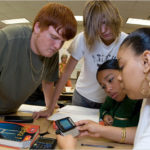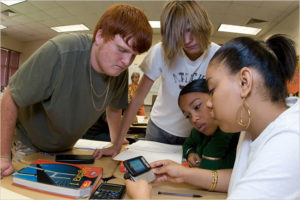
The students entering college today learn much differently from students just a few years older—and that’s mainly because they’ve never known a world without the internet or cell phones, says psychology professor and author Larry D. Rosen, whose research could give educators valuable insights into the needs of today’s learners.
Children born in the 1990s, dubbed the “iGeneration” by Rosen, live in a time of rapidly changing technology, in which they are constantly connected to a number of mobile technologies. Rosen said the “i” stands for both the technologies these students use—such as the iPod, iPhone, and Wii—and the individualized ways in which students use these tools.
“iGeners are growing up with portable technology. Literally from birth, these children are able to grow up using mobile technology,” he said. “But I also look at the little ‘i’ as reflecting the individualized culture—reflecting our needs and desires.”
Rosen said teenagers’ desire for individualized experiences is something they expect will carry over into their education. Jody Steinglass, president of Empire Edge, responded to that need when his company designed Adaptster, an SAT math study tool that differentiates and individualizes learning for its users.
Students take a diagnostics test to determine the areas in which they need to study, and the program creates a customized study guide based on those results.
“A study plan is developed with their strengths and weaknesses in mind,” he said.
Steinglass recognized teens’ connection to their mobile devices and created Adapster specifically for iPhones and iPods, though he is currently working to create an online version as well.
“People don’t want to carry SAT books around with them, but kids already have their iPods with them. So when they have five minutes to kill, they can pull up the [application] and do some problems right then,” he said.
Rosen agreed that iGeners are constantly connected to their mobile devices. He noted that iGeneration students don’t look at the technology as a tool, the way it’s viewed by older generations—even the so-called Millennial generation that preceded today’s teens—but as an expectation. And this affects the way these students learn.
“If we look at kids who spend their entire day online multitasking, in many ways teachers are still asking them to learn one task at a time and in an old-fashioned way,” he said.
Andy Petroski, director of the Learning Technologies Master of Science program at Harrisburg University of Science and Technology in Pennsylvania, said engagement is a key to connecting with today’s students.
“These kids are highly engaged and active in their personal world. Traditional school is so far on the other end of the spectrum for them,” he said. “More than any other generation, they are pleading, ‘Engage me,’ … because to sit and listen and do one thing for long periods is so foreign to their daily lives.”
Petroski agreed that designing multidimensional lessons that take advantage of how students live and work outside of school is a much-needed change in education.
“Encourage multitasking, [both] computer-based and physical, [by] having them switch from one activity to another quickly, or trying to solve multiple problems simultaneously,” he said. “This relates to their working style, but [it] can also help to emphasize that there are times when you need to concentrate on one thing at a time.”
Not everyone would agree that multitasking is a healthy attribute of today’s students. A Stanford University study released last year found that high-tech jugglers have problems paying attention, controlling their memory, or switching from one job to another as well as those who prefer to complete one task at a time.
The study, “Cognitive control in media multitaskers,” published last August in the academic journal Proceedings of the National Academy of Sciences, found that heavy media multitaskers performed worse on a test of task-switching ability.
Rosen said there are a few things about that study that bothered him. First, it was a laboratory study that asked participants to perform tasks no one would do outside a laboratory setting. Second, it used a relatively small sample size (41 students).
“This is quite a small sample to be drawing general conclusions about multitaskers,” Rosen said, adding: “What is needed is in vivo studies.” He said other research has suggested multitaskers take slightly longer to learn information but do not necessarily perform worse on exams.
In his book, Rewired: Understanding the iGeneration and the Way They Learn, Rosen suggests, among many other things, that educators should begin to use cell phones as tools for mobile learning.
“If I were going to do a lecture on [President] Chester Arthur in a room full of kids where most likely all of them have cell phones and many of them have some type of smart phone, I would split them into groups and ask the students to find information about him,” he said. “I would let the kids get engaged with the information. Then I would ask them to do something like create a Facebook or MySpace page based on that information.”
Petroski also recommended encouraging group work, because social networking is such a large part of students’ daily lives.
“Encourage group work … in the classroom through collaborative group work that supports individual activities. Use games as teaching and learning tools,” he added. “Yes, review quizzes can be engaging, but consider using games and simulations as a way to teach concepts through hands-on learning, not just as a way to review concepts taught in a traditional sense.”
Other recommendations that Rosen makes in his book include allowing students to generate original content online as part of lessons; teaching students which media sources to trust and which to avoid; and using the internet to help provide a global perspective.
One problem with today’s multitasking iGeners “is that they spend more time gathering information in breadth rather than depth,” Rosen acknowledged, “and I think this is an issue for educators.” Teachers must teach media literacy and the difference between superficial gathering of information and deeper understanding, he said.
“But after all,” he added, “isn’t that the challenge for all educators?”
Links:
Rewired: Understanding the iGeneration and the Way They Learn
Harrisburg University of Science and Technology
- Student programmers solve real-world challenges - July 12, 2010
- Computers make strides in recognizing speech - June 25, 2010
- On new iPhone, a mystery of dropped calls - June 25, 2010
